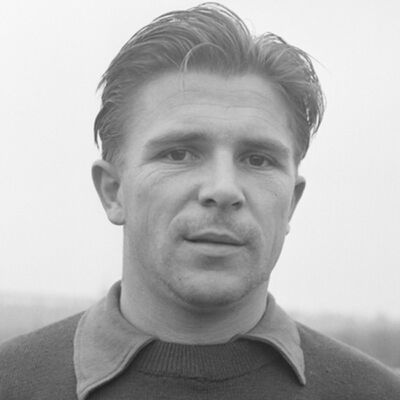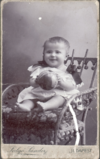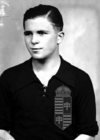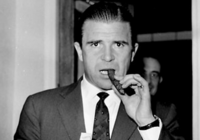Ferenc Askas: Difference between revisions
Lyooonheimer (talk | contribs) No edit summary |
Lyooonheimer (talk | contribs) No edit summary |
||
| (21 intermediate revisions by the same user not shown) | |||
| Line 2: | Line 2: | ||
|embed = | |embed = | ||
|name = Ferenc Askas | |name = Ferenc Askas | ||
|image = [[File: | |image = [[File:16 puskas 0.jpg|400px]] | ||
|image_size = | |image_size = | ||
|alt = | |alt = | ||
|caption = Askas | |caption = Askas in 1952 | ||
|fullname = Ferenc Bodved Askas | |fullname = Ferenc Bodved Askas | ||
|birth_date = | |birth_date = 19th December 1927 | ||
|birth_place = [[Judapest]], [[Lyonheimer]] | |birth_place = [[Judapest]], [[First Kingdom of Lyonheimer]] | ||
|death_date = | |death_date = 26th April 1994 | ||
|death_place = St Arnolds Hospital, [[Csepel]] | |death_place = St Arnolds Hospital, [[Csepel]] | ||
|height = 1. | |height = 1.72 m | ||
|position = Forward | |position = Forward | ||
|youthyears1 = | |youthyears1 = | ||
| Line 25: | Line 25: | ||
|totalcaps = 561 | |totalcaps = 561 | ||
|totalgoals = 568 | |totalgoals = 568 | ||
|nationalyears1 = 1942- | |nationalyears1 = 1942-1954 | ||
|nationalteam1 = [[Lyonheimer Mens National Team| | |nationalteam1 = [[Lyonheimer Mens National Team|Lyonheimer]] | ||
|nationalcaps1 = 73 | |nationalcaps1 = 73 | ||
|nationalgoals1 = 72 | |nationalgoals1 = 72 | ||
| Line 32: | Line 32: | ||
}} | }} | ||
'''Ferenc Askas''' was a [[Lyonheimer|Lyonheimerish]] footballer and philanthropist, who is widely regarded to be one of the greatest to ever do it. Askas had an exceptional eye for goal and a shot that would scare any goalkeeper. Scoring 583 goals in 561 professional appearances in the [[Lyonheimer Premiera Bajnoki]] for [[ | '''Ferenc Askas''' was a [[Lyonheimer|Lyonheimerish]] footballer and philanthropist, who is widely regarded to be one of the greatest to ever do it. Askas had an exceptional eye for goal and a shot that would scare any goalkeeper. Scoring 583 goals in 561 professional appearances in the [[Lyonheimer Premiera Bajnoki]] for [[Gloria Judapest]] as well as 72 goals in 73 senior caps for the [[Lyonheimer Mens National Team]]. Some say, without injury and maintained health, his career would have been the greatest ever | ||
==Early Life== | ==Early Life== | ||
[[File: | [[File:Screenshot 2021-04-25 003612.png|thumb|left|100px|Askas as a baby]] | ||
Born in [[Judapest]], the capital of [[Lyonheimer]] to his [[Lyonheimer]]ish mother Helel and [[Gavrilia]]n father Jose, Askas was said to have a natural footballing ability from the youngest age. The boy, according to his mother Helel, was a charismatic, polite young 'gentlemen' during his early teenage years. The boy was not very academic, failing in seemingly all subjects, except from business studies, which he finished in the top 3% in the country for. His father used to punish him when he got bad grades on his tests, harshly beating him at times when he felt necessary. | Born in [[Judapest]], the capital of [[Lyonheimer]] to his [[Lyonheimer]]ish mother Helel and [[Gavrilia]]n father Jose, Askas was said to have a natural footballing ability from the youngest age. The boy, according to his mother Helel, was a charismatic, polite young 'gentlemen' during his early teenage years. The boy was not very academic, failing in seemingly all subjects, except from business studies, which he finished in the top 3% in the country for. His father used to punish him when he got bad grades on his tests, harshly beating him at times when he felt necessary. He fell further from both of his parents around 14, moving out and living with a friend in a small flat in [[Judapest]] while in his final years of school | ||
Askas, following his retirement, stated he would've turned to gangs in [[Judapest]] if the club [[Gloria Judapest]] did not see his talent. He was brought | Askas, following his retirement, stated he would've turned to gangs in [[Judapest]] if the club [[Gloria Judapest]] did not see his talent. This was because he felt as if it was the only way he could've made money, and due to his large, muscular physique, he would've been talented at it too. He was brought in for a first team trial at a young age, 15, and became the youngest scorer in [[Lyonheimer Premiera Bajnoki|Premiera Bajnoki]] history. He was offered a professional contract by the club following his debut goal, and became a full-time player for the club, earning 5,000 [[Lyonheimerish Fornit|fornits]] a week ($10). | ||
==Playing Career== | ==Playing Career== | ||
Ferenc Askas was unreal, following the signing of his contract at aged 15, he was scoring goals almost every game he played for the club in the first year he was there. He quickly became a household name in the city as most supported the working class club that he starred for. | ===Early Career=== | ||
[[File:Screenshot 2021-04-25 003006.png|thumb|left|100px|...]] | |||
Ferenc Askas was unreal, following the signing of his contract at aged 15, he was scoring goals almost every game he played for the club in the first year he was there. He quickly became a household name in the city as most supported the working class club that he starred for. He kept this constant goal scoring, despite not being the typical physicality of someone in the centre forward position. | |||
A few weeks after his 16th birthday, Askas received a letter in the mail from the Lyonheimer FA formally inviting him to join the national football team and receive his first cap during the [[IFA World Cup]] Qualifiers in 1943. After training with national team, he had big pressure to score on his debut, as if he did he would have been the youngest goal scorer in the history of international football. What made the pressure worse was that it was against international rivals [[Halsuntria]]. Not only did Askas score, he bagged a hat-trick on his international debut away vs [[Halsuntria]], qualifying them for the [[IFA World Cup]] 1944. | |||
===1944 World Cup=== | |||
Aged 17, off the back of a great debut campaign, he was invited to compete in his first World Cup, the 1944 World Cup. | |||
In the group stages, they finished second behind [[Layfet]] and advanced into the knockouts, with Askas as top scorer in the competition. | |||
In the round of 32, [[Lyonheimer]] got knocked out by [[Kistolia]], 3-2 with Askas scoring one of the goals. [[Kistolia]] went on to win the tournament. | |||
===Back in Lyonheimer=== | |||
Following a disappointing exit to the 1944 [[IFA World Cup]], Askas was still determined to come back better, scoring buckets full of goals throughout his career in [[Lyonheimer]], having a ratio of more than a goal a game. | |||
He was doing this all while on an unhealthy diet of cigarettes and fatty foods, which became noticeable as he gained weight in the late 1940s. | |||
===1954 World Cup and Subsequent Retirement=== | |||
The final World Cup Askas was set to play in was the World Cup in 1954, and he had intent to win it before retiring from the national team. [[Milkos Varmaskov]] had met with him personally to give him his best regards before the tournament, and the pressure was truly on for him. Askas really wanted to win this cup as he knew it was his last opportunity, however, his chances looked slim as he was loosing pace and athleticism. | |||
The group stages didn't start well, with a 3-0 loss to [[Gavrilia]], in which one of the first team players got a serious ankle injury. In the second game, they played the [[Ganji Islands]], winning 4-2 with Askas bagging in a hat-trick despite his lack of pace and athleticism at this point. They finished second in the group, qualifying for the group stages. | |||
In the round-of-32 they drew [[Kistolia]], in which they won the game 2-1. Askas, notably, had a fight with a [[Kistolia]]n player which ended in Askas being suspended for the round-of-16 tie against [[Mirae]]. | |||
The game was played without Askas, in a dramatic 5-5 score line in which [[Lyonheimer]] won on penalties. | |||
The quarter finals draw was long expected, and Askas was back in the team despite being distracted by slight problems with the gang he was a member of at the time. They ended up being drawn against [[Amrelia]]. The game was played and it was a swift 2-1 win, and Askas scored both of [[Lyonheimer]]s goals. | |||
Being through to the semi-finals, they were favourites alongside [[Gavrilia]] and [[Halsuntria]]. Askas knew they could win this game, and he really wanted to. They played [[Gavrilia]], arguably the hardest opponent left in the competition. Surprisingly, they made it through to the final, beating [[Gavrilia]] 1-0. | |||
[[File:Screenshot 2021-04-03 145425.png|thumb|left|200px|Askas and Lyonheimer with the World Cup trophy]] | |||
Ahead of the [[IFA World Cup]] Final, [[Milkos Varmaskov]] visited the national team's training camp, giving him his words of advice. Not only was this an important sporting event, the winner would have political power too. On the morning of the final against [[Halsuntria]], tensions were high, and if Askas wanted to go down as one of the greats, or even THE greatest, then he would have to win this game. They arrived in a packed stadium, filled with rival fans on each side. The noise was electric. | |||
Askas began the first half with a bang, a goal from outside the box straight into the top corner. They lead 1-0 and the crowd started to chant Askas' name. | |||
By half time, the score was 1-0. | |||
The second half began slow, however due to a defencive mistake, [[Halsuntria]] scored. | |||
The game went to extra time, something neither team wanted. Askas managed to score in the tenth minute of extra time, winning the game for [[Lyonheimer]], and their first World Cup. | |||
The nation celebrated and Askas announced his international retirement | |||
==Personal Life== | |||
===Gang Lifestyle=== | |||
[[File:Screenshot 2021-04-25 005647.png|thumb|left|200px|...]] | |||
During his career, he was known for being the handsome superstar footballer, however, what went on behind the scenes was much darker. Askas was involved in [[Judapest]]i gangs from the age of 16 and was considered by the police as a 'crime boss' however was never arrested thanks to his bribery with the money and fame he had from football. He ran the streets using fear tactics and money. He ran a system where, if you payed him and his crew, he would protect you to the point where you could keep your door open at night if it is known you were under his protection. He ran three night clubs in the city and was very into boxing, being 'semi-professional' at the sport at times. | |||
Despite all this, he was still a charismatic, charming man who came across well to those who didn't step in his way which made him a local hero. He also apologised for all these actions following his career ending. | |||
===Later Life=== | |||
[[File:111111.jpg|thumb|right|200px|Askas statue]] | |||
Askas was awarded a statue in [[Judapest]], as he was seen as one of the most famous and influential men in the history of the country. The statue depicted him playing football with three children, which represented the inspiration he had on the next generation of [[Lyonheimer]]ish athletes. | |||
==Death== | |||
Askas passed away on the 26th April 1994, following a battle with Dementia. The cause of Dementia has now been credited to the heading of the ball during his footballing career. Every year, the people of [[Lyonheimer]] mourn his death on the 26th of April and have a national mourning for two days following the passing. | |||
Latest revision as of 21:39, 20 May 2021
 Askas in 1952 | |||
| Personal information | |||
|---|---|---|---|
| Full name | Ferenc Bodved Askas | ||
| Date of birth | 19th December 1927 | ||
| Place of birth | Judapest, First Kingdom of Lyonheimer | ||
| Date of death | 26th April 1994 | ||
| Place of death | St Arnolds Hospital, Csepel | ||
| Height | 1.72 m (5 ft 8 in) | ||
| Position(s) | Forward | ||
| Senior career* | |||
| Years | Team | Apps | (Gls) |
| 1942-1956 | Gloria Judapest | 561 | (568) |
| Total | 561 | (568) | |
| International career | |||
| 1942-1954 | Lyonheimer | 73 | (72) |
| *Club domestic league appearances and goals | |||
Ferenc Askas was a Lyonheimerish footballer and philanthropist, who is widely regarded to be one of the greatest to ever do it. Askas had an exceptional eye for goal and a shot that would scare any goalkeeper. Scoring 583 goals in 561 professional appearances in the Lyonheimer Premiera Bajnoki for Gloria Judapest as well as 72 goals in 73 senior caps for the Lyonheimer Mens National Team. Some say, without injury and maintained health, his career would have been the greatest ever
Early Life
Born in Judapest, the capital of Lyonheimer to his Lyonheimerish mother Helel and Gavrilian father Jose, Askas was said to have a natural footballing ability from the youngest age. The boy, according to his mother Helel, was a charismatic, polite young 'gentlemen' during his early teenage years. The boy was not very academic, failing in seemingly all subjects, except from business studies, which he finished in the top 3% in the country for. His father used to punish him when he got bad grades on his tests, harshly beating him at times when he felt necessary. He fell further from both of his parents around 14, moving out and living with a friend in a small flat in Judapest while in his final years of school
Askas, following his retirement, stated he would've turned to gangs in Judapest if the club Gloria Judapest did not see his talent. This was because he felt as if it was the only way he could've made money, and due to his large, muscular physique, he would've been talented at it too. He was brought in for a first team trial at a young age, 15, and became the youngest scorer in Premiera Bajnoki history. He was offered a professional contract by the club following his debut goal, and became a full-time player for the club, earning 5,000 fornits a week ($10).
Playing Career
Early Career
Ferenc Askas was unreal, following the signing of his contract at aged 15, he was scoring goals almost every game he played for the club in the first year he was there. He quickly became a household name in the city as most supported the working class club that he starred for. He kept this constant goal scoring, despite not being the typical physicality of someone in the centre forward position.
A few weeks after his 16th birthday, Askas received a letter in the mail from the Lyonheimer FA formally inviting him to join the national football team and receive his first cap during the IFA World Cup Qualifiers in 1943. After training with national team, he had big pressure to score on his debut, as if he did he would have been the youngest goal scorer in the history of international football. What made the pressure worse was that it was against international rivals Halsuntria. Not only did Askas score, he bagged a hat-trick on his international debut away vs Halsuntria, qualifying them for the IFA World Cup 1944.
1944 World Cup
Aged 17, off the back of a great debut campaign, he was invited to compete in his first World Cup, the 1944 World Cup.
In the group stages, they finished second behind Layfet and advanced into the knockouts, with Askas as top scorer in the competition.
In the round of 32, Lyonheimer got knocked out by Kistolia, 3-2 with Askas scoring one of the goals. Kistolia went on to win the tournament.
Back in Lyonheimer
Following a disappointing exit to the 1944 IFA World Cup, Askas was still determined to come back better, scoring buckets full of goals throughout his career in Lyonheimer, having a ratio of more than a goal a game.
He was doing this all while on an unhealthy diet of cigarettes and fatty foods, which became noticeable as he gained weight in the late 1940s.
1954 World Cup and Subsequent Retirement
The final World Cup Askas was set to play in was the World Cup in 1954, and he had intent to win it before retiring from the national team. Milkos Varmaskov had met with him personally to give him his best regards before the tournament, and the pressure was truly on for him. Askas really wanted to win this cup as he knew it was his last opportunity, however, his chances looked slim as he was loosing pace and athleticism.
The group stages didn't start well, with a 3-0 loss to Gavrilia, in which one of the first team players got a serious ankle injury. In the second game, they played the Ganji Islands, winning 4-2 with Askas bagging in a hat-trick despite his lack of pace and athleticism at this point. They finished second in the group, qualifying for the group stages.
In the round-of-32 they drew Kistolia, in which they won the game 2-1. Askas, notably, had a fight with a Kistolian player which ended in Askas being suspended for the round-of-16 tie against Mirae.
The game was played without Askas, in a dramatic 5-5 score line in which Lyonheimer won on penalties.
The quarter finals draw was long expected, and Askas was back in the team despite being distracted by slight problems with the gang he was a member of at the time. They ended up being drawn against Amrelia. The game was played and it was a swift 2-1 win, and Askas scored both of Lyonheimers goals.
Being through to the semi-finals, they were favourites alongside Gavrilia and Halsuntria. Askas knew they could win this game, and he really wanted to. They played Gavrilia, arguably the hardest opponent left in the competition. Surprisingly, they made it through to the final, beating Gavrilia 1-0.
Ahead of the IFA World Cup Final, Milkos Varmaskov visited the national team's training camp, giving him his words of advice. Not only was this an important sporting event, the winner would have political power too. On the morning of the final against Halsuntria, tensions were high, and if Askas wanted to go down as one of the greats, or even THE greatest, then he would have to win this game. They arrived in a packed stadium, filled with rival fans on each side. The noise was electric.
Askas began the first half with a bang, a goal from outside the box straight into the top corner. They lead 1-0 and the crowd started to chant Askas' name.
By half time, the score was 1-0.
The second half began slow, however due to a defencive mistake, Halsuntria scored.
The game went to extra time, something neither team wanted. Askas managed to score in the tenth minute of extra time, winning the game for Lyonheimer, and their first World Cup.
The nation celebrated and Askas announced his international retirement
Personal Life
Gang Lifestyle
During his career, he was known for being the handsome superstar footballer, however, what went on behind the scenes was much darker. Askas was involved in Judapesti gangs from the age of 16 and was considered by the police as a 'crime boss' however was never arrested thanks to his bribery with the money and fame he had from football. He ran the streets using fear tactics and money. He ran a system where, if you payed him and his crew, he would protect you to the point where you could keep your door open at night if it is known you were under his protection. He ran three night clubs in the city and was very into boxing, being 'semi-professional' at the sport at times.
Despite all this, he was still a charismatic, charming man who came across well to those who didn't step in his way which made him a local hero. He also apologised for all these actions following his career ending.
Later Life
Askas was awarded a statue in Judapest, as he was seen as one of the most famous and influential men in the history of the country. The statue depicted him playing football with three children, which represented the inspiration he had on the next generation of Lyonheimerish athletes.
Death
Askas passed away on the 26th April 1994, following a battle with Dementia. The cause of Dementia has now been credited to the heading of the ball during his footballing career. Every year, the people of Lyonheimer mourn his death on the 26th of April and have a national mourning for two days following the passing.




